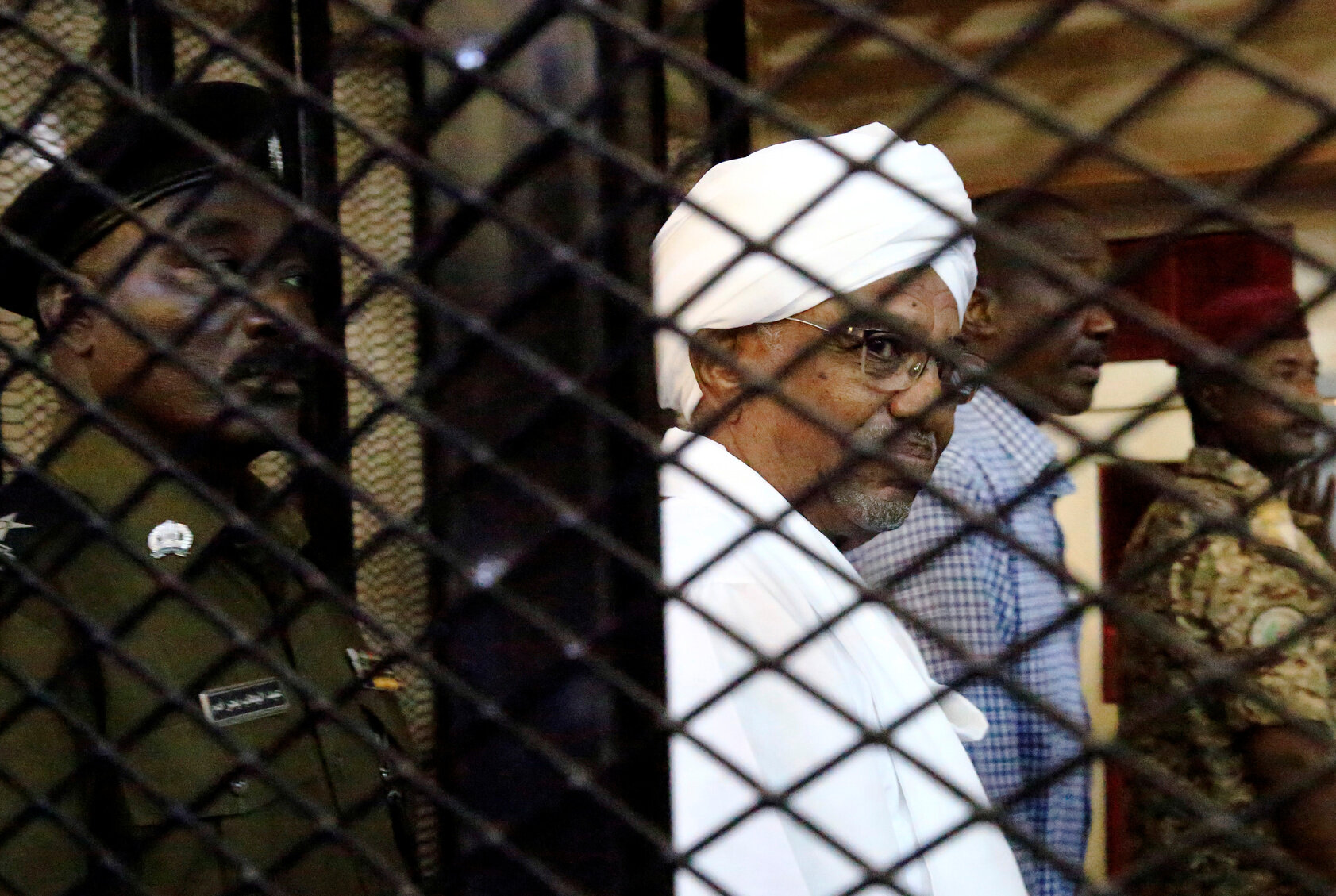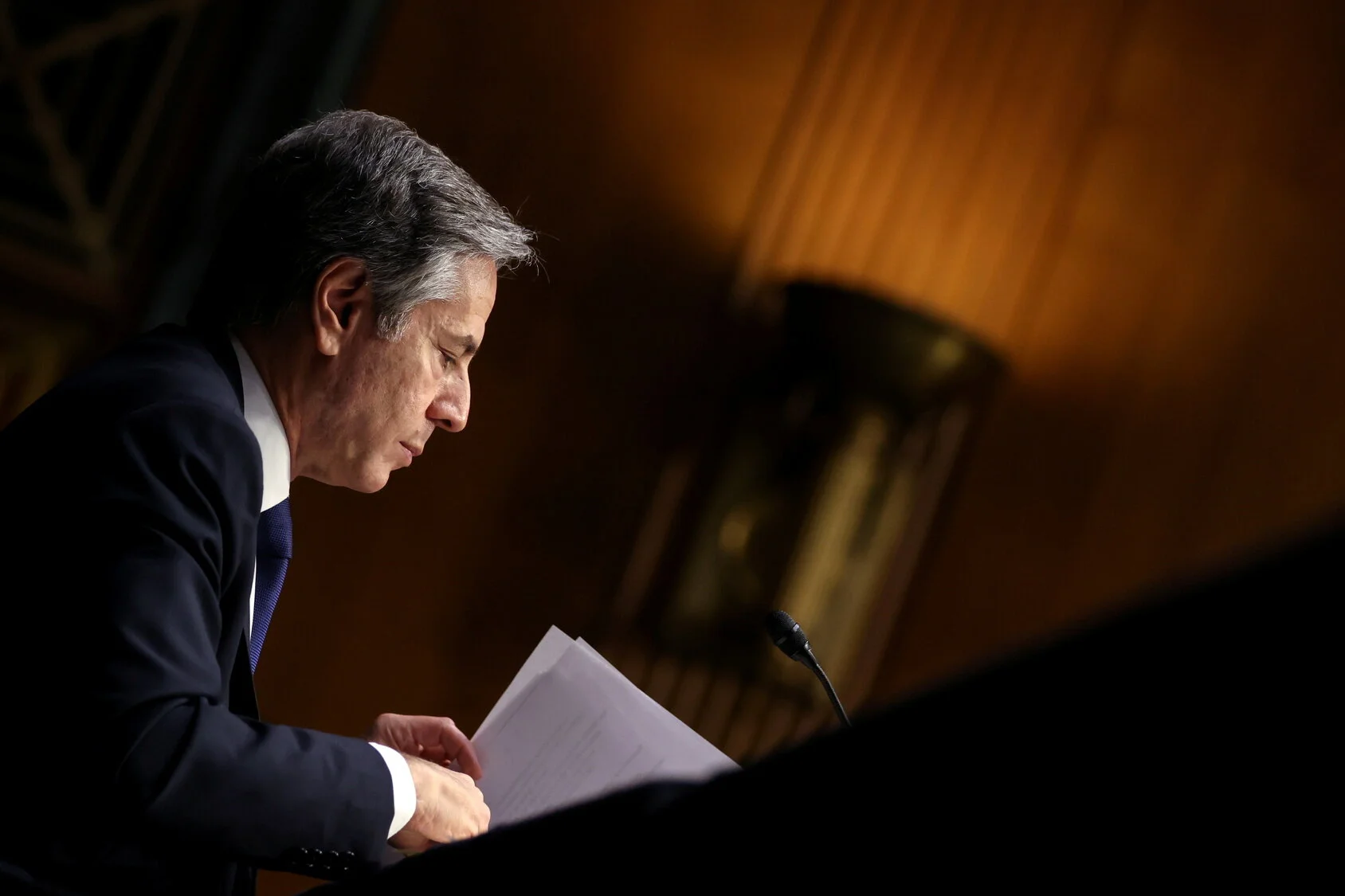News & Updates
Check out the latest from Sudan and our movement
New Cryptocurrencies Accepted As Donations
Discover the new tokens that can now be donated to our mission in Sudan.
Operation Broken Silence started accepting cryptocurrency donations in 2020. Since then, we have steadily expanded tokens that can be given to our mission in Sudan. As of today, you can donate:
Our supporters have already donated $3,390 in crypto out of our $20,210 goal for this year. With the addition of these ten new tokens, there are more ways to donate cryptocurrency than ever.
Operation Broken Silence sells most of the crypto you donate, using the cash proceeds to fuel the programs we support in Sudan. We HODL to a small portion of what you give as part of a rainy day fund and to keep a little skin in the game.
We are partnered with The Giving Block to accept cryptocurrency donations. And giving crypto has never been easier:
The IRS classifies cryptocurrency as property for tax purposes. You receive a deduction for the fair market value of the crypto when you donate to Operation Broken Silence, avoiding capital gains tax you would incur if you had sold crypto and donated cash.
That means you’re able to donate more, as well as deduct more on your taxes. Consult your financial advisor to learn more.
About Us
Operation Broken Silence is building a global movement to empower the Sudanese people through innovative programs as a 501(c)(3) nonprofit organization.
We focus on empowering Sudanese change makers and their critical work. Learn more.
Donations are tax-deductible within the guidelines of U.S. law. Give here.
Sudan to hand former dictator to International Criminal Court
The 77-year-old war criminal may now face an uphill legal battle that he never anticipated.
The transitional government of Sudan will surrender former dictator Omar al-Bashir and other indicted war criminals to the International Criminal Court for trial. “The cabinet decided to hand over wanted officials to the ICC," Foreign Minister Mariam al-Mahdi said on Wednesday.
In 2009, the International Criminal Court (ICC) issued a global arrest warrant for Bashir related to war crimes and crimes against humanity being committed by regime forces in Darfur. The ICC issued a second arrest warrant for Bashir the following year for the crime of genocide. The official charges stem from the 2003-2008 period:
Five counts of crimes against humanity including murder, extermination, forcible transfer, torture, and rape.
Two counts of war crimes: intentionally directing attacks against a civilian population as such or against individual civilians not taking part in hostilities, and pillaging.
Three counts of genocide: by killing, by causing serious bodily or mental harm, and by deliberately inflicting on each target group conditions of life calculated to bring about the group's physical destruction.
The decision to hand Bashir over to the ICC came during a visit to Sudan by the international court’s chief prosecutor Karim Khan.
A changing Sudan puts Bashir on his heels
Bashir, who is now 77 years old, may face an uphill legal battle that he never anticipated. His regime refused to allow ICC investigators into Darfur while in power, restraining the court’s ability to build a more robust case against his government.
But after Bashir and some of his henchmen were ousted by the military in 2019 following months of nationwide protests, the new transitional government has steadily became more open to the ICC. Sudan’s attorney general Mubarak Mahmoud said on Tuesday that his office will cooperate with the ICC on cases concerning Darfur in order to bring justice to victims.
Human rights investigators have long been denied access to Darfur, where millions of Sudanese remain oppressed. The transitional government’s new promises of support to the ICC could be the leverage that international prosecutors have long needed.
Getting into Darfur may still prove difficult though. The region remains under the iron fist of the Rapid Support Forces (RSF), a powerful Bashir-era paramilitary outfit that has so far survived Sudan’s revolution. The commander of the RSF, Mohamed Hamdan Dagalo (aka Hemeti), has also been accused of war crimes and crimes against humanity, although he has not been indicted by any court to date. Hemeti is also one of the key leaders in Sudan’s transitional government.
But this reality doesn’t mean that progress is impossible. Last year, Sudanese war criminal Ali Muhammad Ali Abd–Al-Rahman, aka Ali Kushayb, was forced to flee his stronghold in Darfur when forces under the command of the transitional government flipped on him. A few months later, he was captured in the Central African Republic and promptly turned over to the ICC.
Although it appears a handful of Sudan’s war criminals will soon face justice for their crimes, the damage they have left in their wake will take decades to repair.
The Bashir regime launched a second genocidal war against the southern Nuba Mountains region in 2011. Mass regime war crimes quickly gave way to a humanitarian crisis. Even though a ceasefire is in effect today, hundreds of thousands of the Nuba people still lack access to education, healthcare, and other basic services.
Operation Broken Silence is still the only nonprofit in the world funding community-led education efforts in Yida Refugee Camp, where many of the Nuba people now live. Without Endure Primary and Renewal Secondary Schools that we support there, the entire education system would collapse.
As we mentioned in our last update, we need your help to raise an immediate $5,525 for the following special projects at the schools:
$3,900 for classroom repairs, including replacement roofing from severe storm damage and some other minor upkeep.
$1,625 for textbook printing. After years of unfulfilled promises to deliver textbooks from the national education ministry, our education partner has secured a printer and binder and is moving forward with making their own.
There are three ways you can help. You can start a campaign and ask friends and family to give, setup a small monthly recurring donation, or make a generous one-time gift.
Additional ways to support:
Make checks payable to Operation Broken Silence, write Education in the memo line, and mail to P.O. Box 770900 Memphis, TN, 38177-0900
About Us
Operation Broken Silence is building a global movement to empower the Sudanese people through innovative programs as a 501(c)(3) nonprofit organization.
We focus on empowering Sudanese change makers and their critical work. Learn more.
Donations are tax-deductible within the guidelines of U.S. law. Give here.
Yida Education Update - August 2021
Get the latest news from our education program in Yida Refugee Camp!
In 2015, Operation Broken Silence began funding four Nuba teachers in Yida Refugee Camp. They were giving lessons underneath a tree with a single, broken chalkboard.
With your support, their small effort has blossomed into the Endure Primary and Renewal Secondary Schools. You empower 24 Nuba teachers here. They run the show —not us— and oversee 1,400 students in their classrooms every week.
Endure Primary is one of the top performing schools in the region and a treasured possession of the Nuba community. More than 6,000 children have been served by the school to date. Renewal Secondary began a multi-year phased opening in 2019 and has already shown great promise.
One of the largest demographics in Yida is children under the age of 16. The teachers’ vision has always been to ensure that every single child in Yida has the opportunity to attain a quality education.
Student Spotlight
Dowa was only three years old when her mother brought her to Yida Refugee Camp. She doesn’t really remember life before then. The government of Sudan bombed their village in the Nuba Mountains. Her father —a farmer— headed to the frontlines. Dowa’s mother set out on the nine day journey to Yida across the border.
That was seven years ago. Although Sudan’s long-time dictator Omar al-Bashir was overthrown in 2019, many of his henchmen sit atop the new transitional government. A fragile ceasefire in the Nuba Mountains is holding, but Dowa’s mother isn’t returning until a peace agreement is finalized. She says:
“The government has always hated us. They try to kill us even when they say they want the shooting to stop. We can’t go back until the generals have proven they have changed or until they are gone.”
Thankfully, Yida is a relatively safe place. Dowa is a student at the Endure Primary School, a place that feels like home to her. Here, she not only learns something new every week, but also gets to play with friends and talk about their country’s future. She says:
"Sometimes it feels like all of us here are waiting. Waiting for peace. Waiting to return home. Waiting for powerful people to decide our future. But here at school, we learn that we have power and can be the generation who brings change. We’re encouraged to talk about who we want to be when we finally go home.
I think this gives my mother hope. She only knows war. She never went to school. When she sees me learning and playing with friends, it gives her joy.”
National Exam Results
In May, we reported that national exam results had been delayed due to school closures brought on by COVID-19. Teachers and students were still optimistic about their success despite a tough season.
Results are finally in for Endure Primary and they’re the best yet. 99.9% of students passed their national exams! Only one student failed after missing school for three months due to unique family needs. One of the teachers is working to get her caught up now.
We are still waiting on test results for Renewal Secondary. Our Nuba education partner in Yida is expecting those any day now.
New Teachers
The larger and positive changes in how Sudan is governed are finally being felt in the Nuba Mountains just across the border. Security in some frontline areas is still erratic, but much of the region remains quiet. There is increased movement between areas controlled by the Sudanese government and Nuba self-defense forces. And some refugees in Yida are now trying to return home.
A handful of teachers from Endure Primary and Renewal Secondary recently headed back to their villages in the Nuba Mountains. One of the teachers hadn’t been back since 2014 and their departure was bittersweet. Our education partner was able to replace them quickly with virtually no disruption for the students.
For now, it appears quite a few people have no plans to leave Yida. Our education partner has always expected that —one day— Endure Primary and Renewal Secondary will need to be relocated into the Nuba Mountains. At this moment, that day isn’t today.
Classroom Conditions
Over the past three years, we’ve worked with our education partner to improve classroom infrastructure at Endure Primary and Renewal Secondary. Thunderstorms were repeatedly damaging classrooms and forcing expensive repairs. By early 2020, all classrooms had received significant weatherproofing and strengthened roofs.
Last update, we reported that an unusually bad thunderstorm had caused minor damage to two classrooms at Renewal Secondary and tore the roof off of another. Thanks to your fundraising and giving, the damage was repaired and classes resumed.
Another strong thunderstorm recently rolled through the camp and severely damaged two classrooms at Endure Primary. The classrooms remain closed for now, with a temporary open-air covering being used in their place.
This obviously isn’t the best news, but it’s worth noting that previous upgrades continue to prevent even more extensive damage. Stronger thunderstorms like these in the past were regularly damaging over half the classrooms. The strengthened roofing and additional weatherproofing has led to a roughly 60% reduction in maintenance costs. More importantly, this means far less time spent missing class for students.
Funding & Morale
The new semester began at the end of February. Teacher and student morale is high at the moment, although there is still a bit or tiredness in the staff. Less funding in 2020 —due to the economic fallout of the disease— took a toll here just like it did elsewhere in the world.
Fundraising for the teachers and students continues to improve. Our supporters have restored 40% of the funding the schools lost last year. There are also some maintenance and textbook needs delayed last Fall that can no longer be ignored. We need your help to raise an immediate $5,525 for the following special projects:
$3,900 for classroom repairs, including replacement roofing from severe storm damage and some other minor upkeep.
$1,625 for textbook printing. After years of unfulfilled promises to deliver textbooks from the national education ministry, our education partner has secured a printer and binder and is moving forward with making their own.
There’s still a long road ahead, but we’re trending in the right direction. Read on to learn how you can help us continue making progress.
Get Involved
Operation Broken Silence is still the only nonprofit in the world funding community-led education efforts in Yida. Without Endure Primary and Renewal Secondary, the entire education system here would collapse.
There are three ways you can help. You can start a campaign and ask friends and family to give, setup a small monthly recurring donation, or make a generous one-time gift.
Additional ways to support:
Make checks payable to Operation Broken Silence, write Education in the memo line, and mail to P.O. Box 770900 Memphis, TN, 38177-0900
About Nuba
The Nuba Mountains are home to roughly 100 African tribal groups who have lived here for over 2,000 years.
The roughly 1.3 million Christian, Muslim, and traditionalist Nuba people live mostly in harmony together.
Sadly, the Nuba way of life has been in danger for decades. Sudan’s military and extremist regime officials have long viewed the Nuba people as a threat to their iron-fisted rule. The military and their extremist paramilitary allies have committed two genocides in the region since the 1990s.
Sudanese dictator Omar al-Bashir was overthrown in a military coup in April 2019. Sudan now has a fledgling transitional government that is supposed to be moving the country toward civilian, democratic rule. A fragile ceasefire is in place right now, but war clouds still loom over the Nuba Mountains.
Operation Broken Silence focuses on the Nuba Mountains and nearby Yida Refugee Camp. We are the only funder of education efforts in Yida Refugee Camp. Your generous support is essential for the teachers. Learn more about our mission here.
Movement Spotlight: 2021 Governor's School
Tennessee’s top high school students are propelling our mission in Sudan forward.
For the last 6 years, Operation Broken Silence has been part of Nonprofit Day at Governor’s School for International Studies, hosted by the University of Memphis. Some of the brightest high school students from across Tennessee participate in this program to explore their interests in global issues, diplomacy, and human rights.
This year, a group of these incredible young people updated one of our fundraising campaigns that benefits the two schools we sponsor in Yida Refugee Camp. Amelia Lemmon, a rising senior at Station Camp High School in Hendersonville, TN said:
“While I've learned a little about the civil war in Sudan before, the education I got from working on this fundraiser was shocking. I had no idea about the magnitude of refugees and how many people were suffering. Learning about this has made me more internationally aware of something that requires justice.”
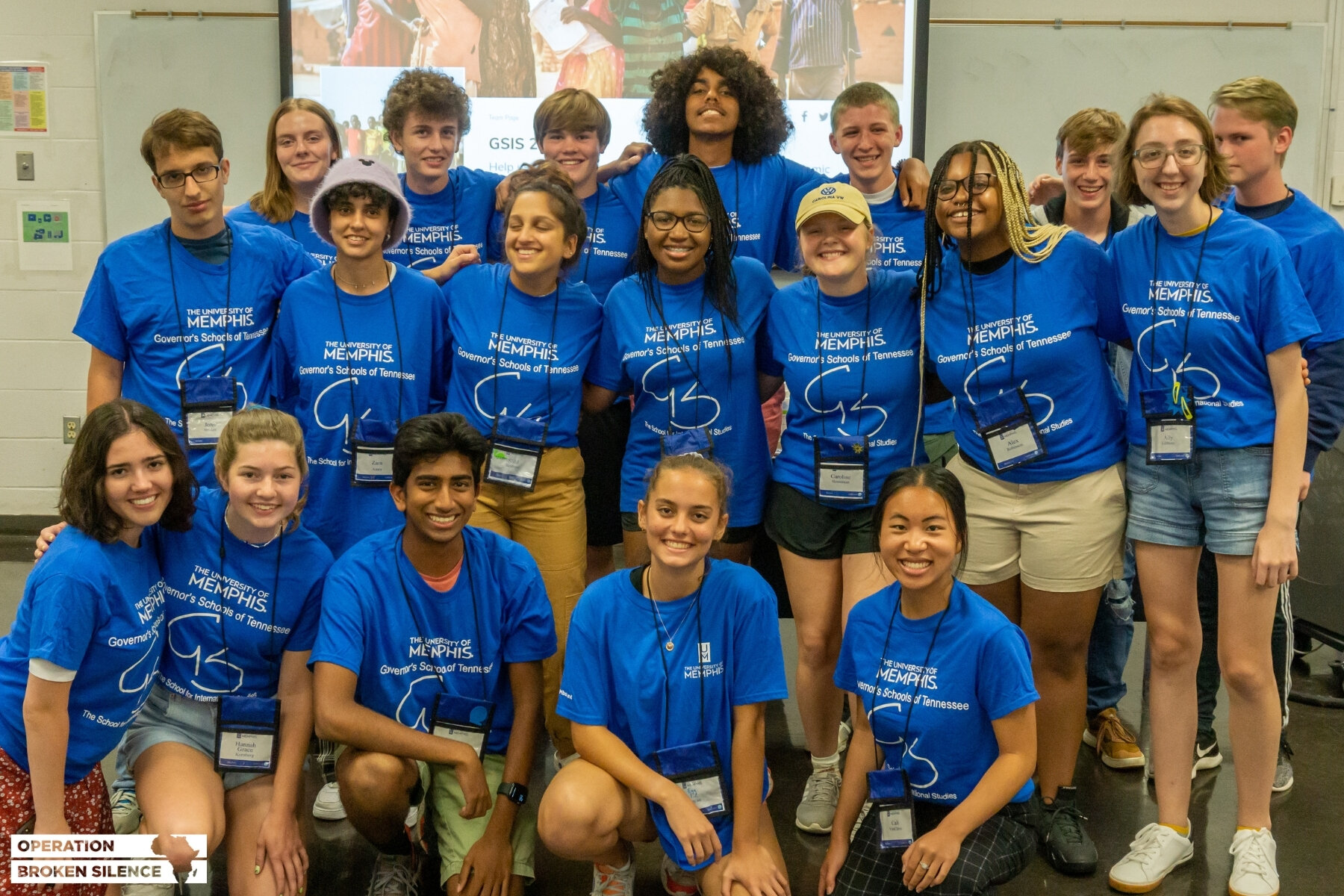
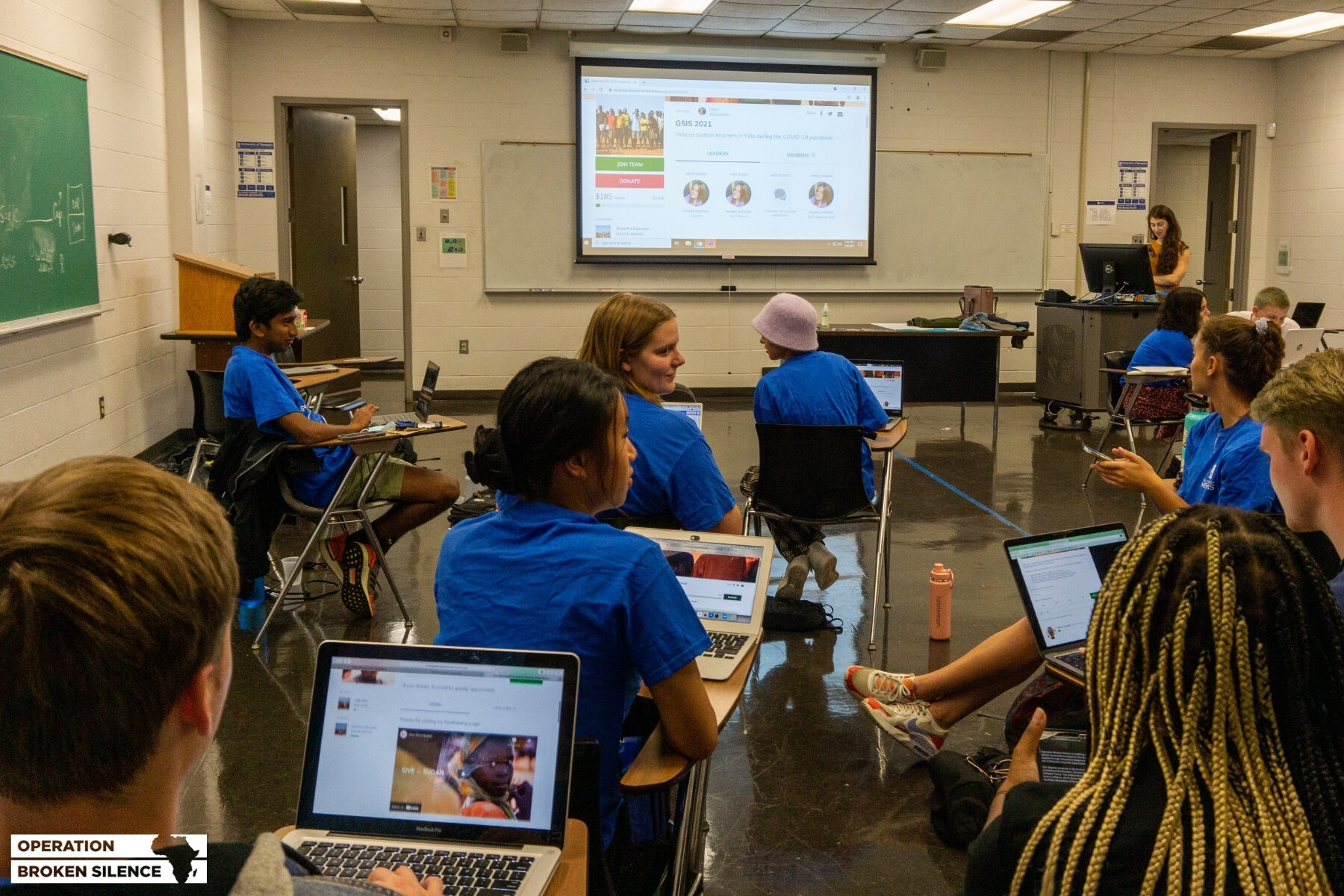
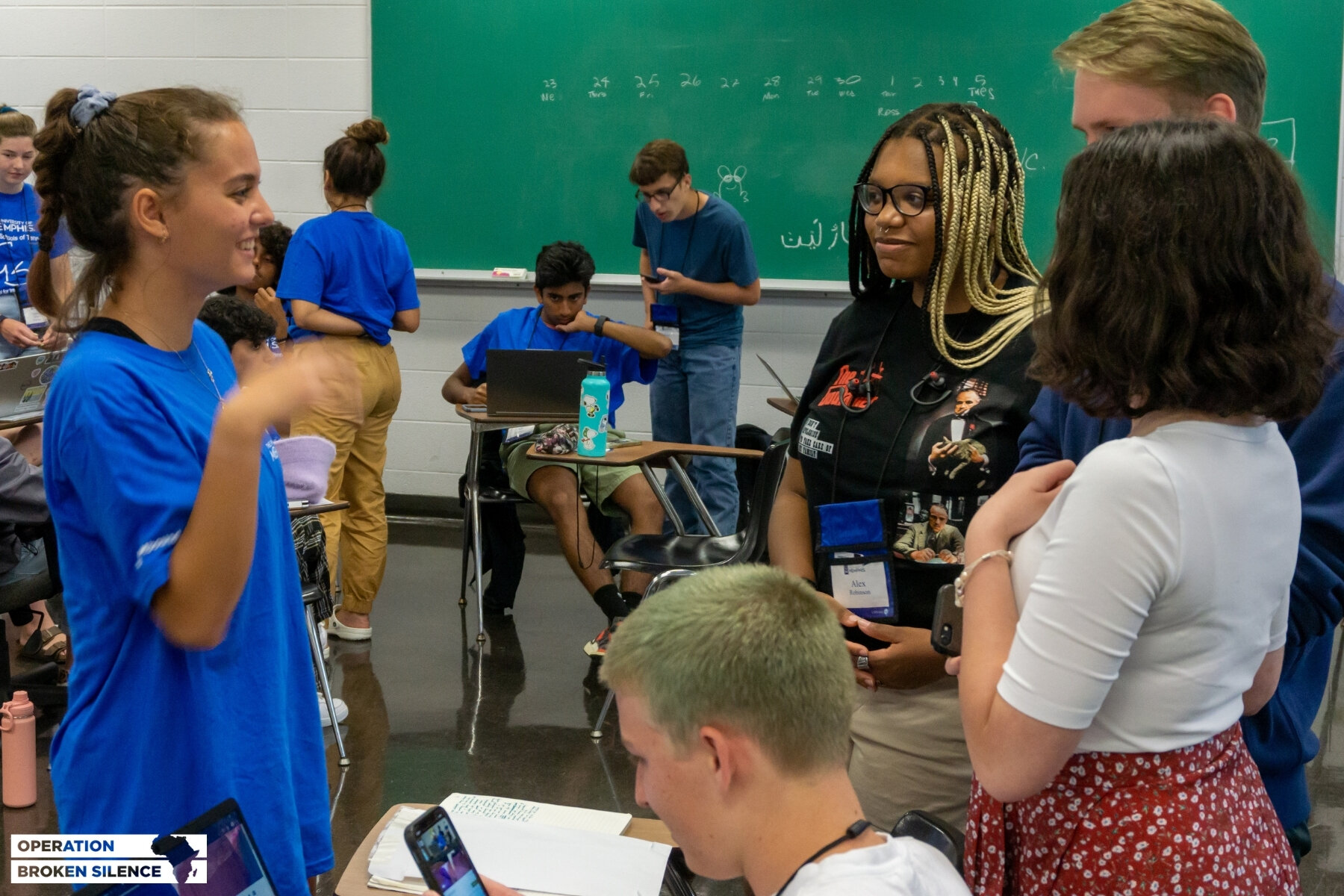
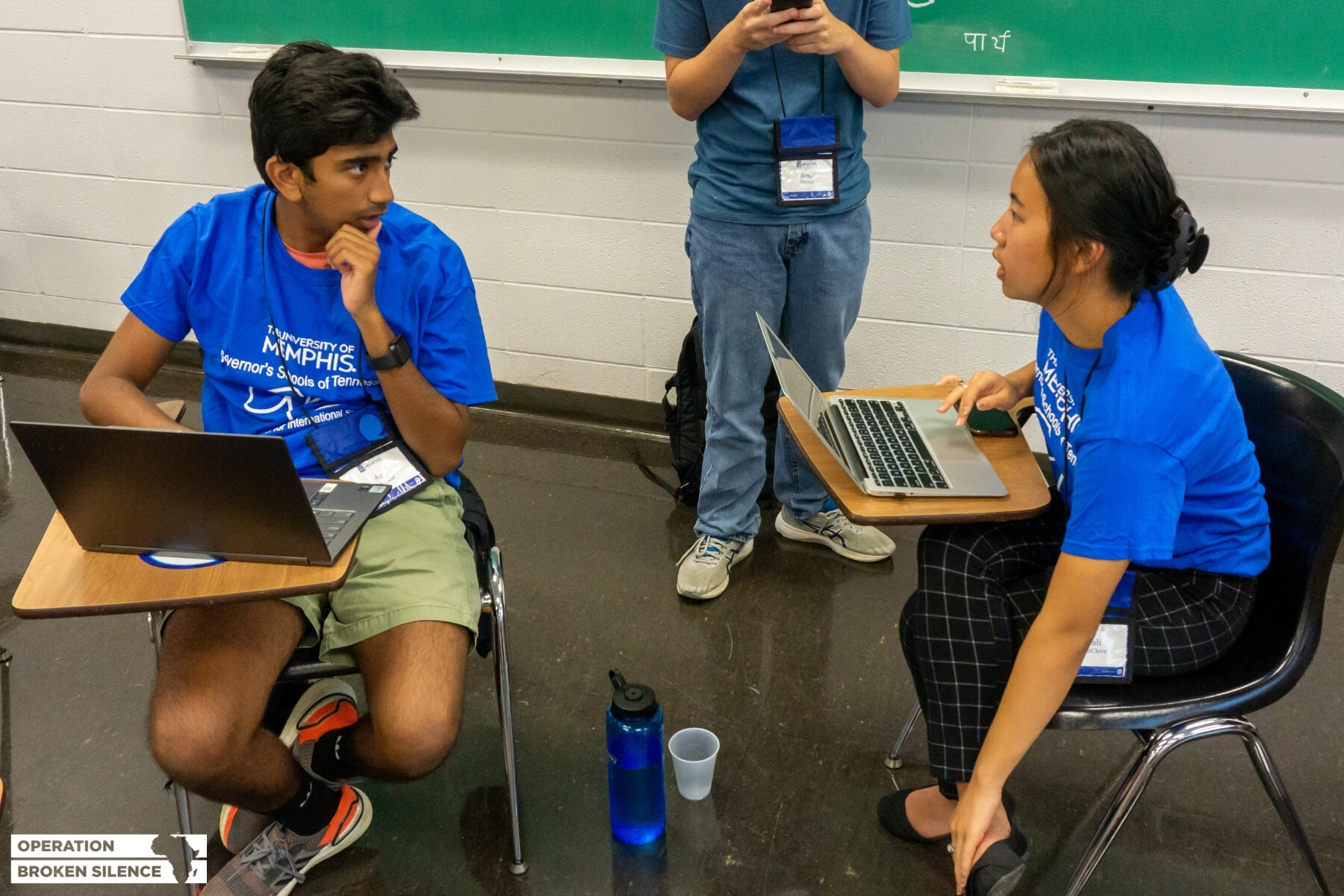
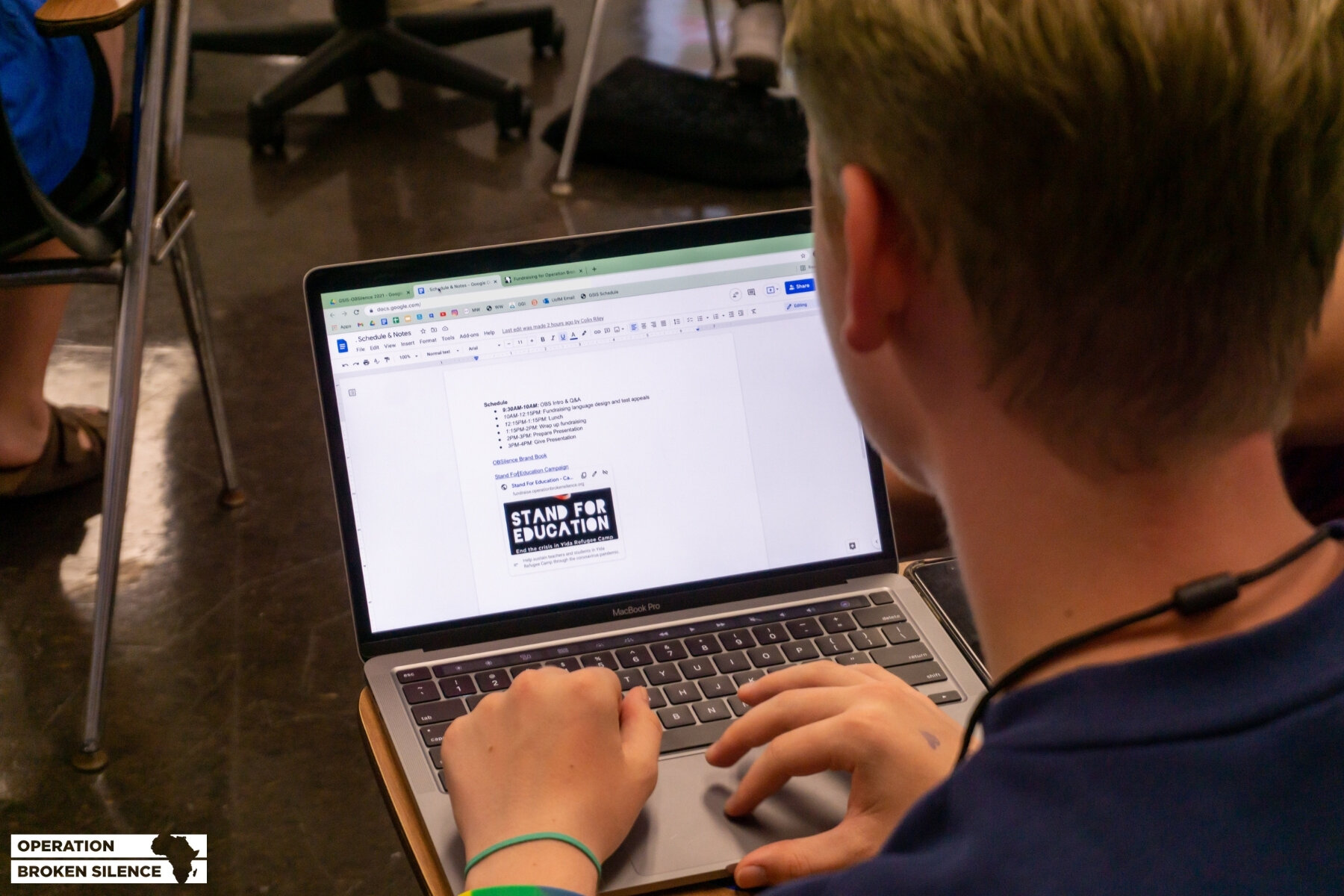
Amelia and her peers collaborated on creating the language in our fundraising campaign. After deciding how to tell the story of our education program, they tested out the campaign by starting fundraising pages of their own, raising over $800 in the first hour. Amelia shared her experience with us:
“I learned that as a group, we have the ability to do incredible things. All it took was a few hours of sustained effort to raise enough money to make meaningful change in Sudan. If we continued that effort in our day-to-day lives, after we leave Governor's School, it would have tremendous impacts on our world.”
By the end of the day, the students raised over $1,500, enough to help with teacher salaries and basic supply needs! When asked what Amelia thought people might want to know about fundraising with Operation Broken Silence, she shared:
“For anyone considering getting involved with Operation Broken Silence, I would tell them to go for it! But also make sure to understand the weight of the conflict in Sudan and keep in mind that all the work you do is benefitting real life people.”
GET INVOLVED
Operation Broken Silence is the only nonprofit in the world funding community-led education efforts in Yida. Without the Endure Primary and Renewal Secondary Schools, the entire education system here would collapse.
Young leaders just like Amelia and her peers help fund these teachers and students. You can join them by launching your own fundraising page or making a donation to their team.
Additional ways to support:
Make checks payable to Operation Broken Silence, write Education in the memo line, and mail to P.O. Box 770900 Memphis, TN, 38177-0900
Thank you, Amelia, and the rest of the Governor’s School students and staff for another wonderful year!
Your impact will echo forward into the months and years ahead.
With gratitude,
Audrey Geyer
Development Director
About Us
Operation Broken Silence is building a global movement to empower the Sudanese people through innovative programs as a 501(c)(3) nonprofit organization.
We focus on empowering Sudanese change makers and their critical work. Learn more.
Donations are tax-deductible within the guidelines of U.S. law. Give here.
2021 Report to Congress: The Elie Wiesel Act
More than two years ago, you helped us turn the most sweeping anti-genocide legislation in history into federal law. Here’s the impact it is now having.
In 2018, over 600 of our supporters in Tennessee came together to make The Elie Wiesel Genocide and Atrocities Prevention Act federal law.
As an organization with years of experience working on the frontlines in Sudan, we are intimately familiar with what happens when the U.S. government fails to take early action in the face of genocide, war crimes, and other mass atrocity crises. This bill was crafted to help ensure the U.S. government has the tools, training, and funding needed to save lives and promote peace when mass atrocity threats emerge around the globe.
We called and wrote our House and Senate congressional offices. Your voices were heard in Washington DC. The Senate passed the legislation by unanimous consent and seven out of the nine Representatives from Tennessee voted in favor of the legislation. On January 14, 2019, we declared victory as the President of the United States signed the bill into law.
That was well over two years ago. Since then, The Elie Wiesel Act has slowly been implemented across the U.S. government. One major requirement of the law — found in Section 5 — is that the President report the following to Congress annually:
What actions have been taken to prevent and respond to mass atrocity crises.
An assessment of countries and regions at risk of atrocity crimes.
Information concerning Foreign Service Officers receiving atrocity prevention training.
Funding used to advance atrocity prevention activities, including transitional justice measures.
Recommendations to further strengthen U.S. capabilities.
The 2021 Report
The U.S. State Department’s Bureau of Conflict and Stabilization Operations just released the latest report.
This is an excellent opportunity to understand the lasting impact of our previous advocacy efforts.
This year’s report covers the period of July 2020 to May 2021 and is available to the public through its submission to Congress. The President is also allowed to submit additional classified information if considered necessary, which he chose to do this year.
This report allows organizations like ours that work in atrocity prevention and response spaces to have a better understanding of what the U.S. government is doing. From there, we can provide further recommendations based on what we are seeing on the ground and better allocate our own resources.
You can listen to some introductory remarks about the importance of these efforts and this report from U.S. Secretary of State Antony Blinken:
The full report is rather long and can be viewed here. I’ve provided a summary below:
Global Assessment of Current or Past Atrocities and United States Response
Following the February 2021 coup in Myanmar, Department of Defense engagements were suspended. The Treasury and Commerce departments targeted the regime’s economic revenue generators. The State Department (State) and USAID are supporting human rights documentation to advance accountability.
Secretary Blinken affirmed in January 2021 that the Chinese government is committing genocide against Uyghurs in Xinjiang. Treasury sanctioned Chinese government entities and government officials. U.S. Customs and Border Protection issued six orders prohibiting imports of merchandise from Xinjiang that have reasonable indication of forced Uyghur labor. State continued visa restrictions on Chinese government officials believed to be responsible for the Uyghur genocide.
In March 2021, Secretary Blinken stated that acts of ethnic cleansing were being committed in Western Tigray, Ethiopia. USAID Administrator Samantha Power called for humanitarian access. The United States imposed defense trade controls on Ethiopia and provided more than $305 million in humanitarian assistance. USAID increased support to the Ethiopian Human Rights Commission for investigators, strategic communications support, personal protective equipment, and training.
State provided nearly $9 million to UN investigators uncovering ISIS war crimes in Syria and Iraq and $2.3 million to the UN to investigate crimes by the Assad regime in Syria. USAID and State are supporting humanitarian assistance, first responders such as the Syrian Civil Defense, and safe and voluntary returns for displaced persons in Iraq and Syria.
In South Sudan, State coordinated support to establish an African Union hybrid court to investigate and prosecute war criminals. State is supporting civil society documentation to further truth, justice, and accountability and to collect and preserve evidence. USAID is supporting civil society and independent media to promote political stability, peacebuilding, and citizen participation in peace efforts.
Early Warning Assessments of Atrocity Risk
The Atrocity Early Warning Task Force is now utilizing the State Department’s Early Warning Assessment, the Intelligence Community’s Mass Atrocities Risk Assessment, and the U.S. Holocaust Memorial Museum’s Statistical Risk Assessment.
State has expanded its quarterly early warning assessment to cover 153 countries, up from 99 countries. This section includes a classified annex that speaks to additional countries being assessed as at risk of atrocities.
State integrated data on political violence targeting women in its analytical products and funded development of gender-sensitive early warning indicators.
Current U.S. Government Efforts To Prevent and Respond to Atrocities
The State Department (State) and USAID formally reported approximately $6.2 million for atrocity prevention programming in FY 2020.
State utilized $2.5 million in Economic Support Funds (ESF) to engage youth to promote justice, reconciliation, and violence prevention; enhance civil society organizations’ capacity to promote social cohesion, truth-telling, and conflict mediation; support civil society and victims’ participation in community and state-level transitional justice processes and mechanisms; strengthen memory sites’ capacity to mitigate atrocity risk; and improve access to accountable and citizen-responsive justice institutions.
State utilized $2.5 million in International Narcotics Control and Law Enforcement (INCLE) earmarks to strengthen justice sector capacity to recognize and respond to atrocities and monitor law enforcement abuses.
State utilized a $5 million Congressional directive to promote accountability for mass atrocity crimes through the UN mechanisms for Syria and Iraq.
State used rapid response funding mechanisms to support survivors or those at imminent risk of gender-based violence, victims of religious persecution, and human rights defenders under attack due to their promotion of the rights of lesbian, gay, bisexual, transgender, and intersex persons.
State funded the Global Initiative for Justice, Truth and Reconciliation, a rapid response mechanism that provides transitional justice assistance.
USAID programming in Niger increased access to justice and is addressing societal cleavages. Programs in Burkina Faso built government capacity to prevent and prosecute human rights violations and reduce the appeal of violent extremism. USAID is delivering training on conflict mitigation to women in four territories in the Democratic Republic of the Congo.
The Treasury Department sanctioned individuals in China, Cambodia, Gambia, Haiti, Iraq, Lebanon, Russia, South Sudan, and Yemen for their connection to serious human rights abuses.
In FY 2020, the Department of Homeland Security (DHS) arrested 11 individuals for human rights-related violations, removed 30 known or suspected human rights violators, and stopped at least 15 human rights violators and war criminals from entering the United States. DHS opened 24 new criminal investigations and is pursuing over 1,600 leads and removal cases involving suspected gross human rights violators from 95 different countries.
State supported accountability processes for atrocity crime allegations against nationals from the former Yugoslavia, Rwanda, Chad, Cambodia, Sierra Leone, Guatemala, Colombia, and the Central African Republic.
State facilitated the voluntary surrender of Dominic Ongwen to the International Criminal Court, where he was sentenced to 25 years for war crimes and crimes against humanity committed in Uganda.
State has supported the Kosovo Specialist Chambers, which has begun trying individuals for crimes against humanity and war crimes.
State supported transitional justice processes in Colombia, including access for victims to participate. In April 2021, former FARC commanders announced they would accept factual findings of Colombia’s Special Jurisdiction for Peace and accept responsibility for charges of war crimes and crimes against humanity.
In April 2021, President Biden formally recognized the Armenian Genocide.
Atrocity Prevention Training for U.S. Government Personnel
State delivered its online atrocity prevention course to 365 personnel and additional courses to 88 personnel. USAID delivered its online course to 78 staff and a multi-day course to 36 staff.
The U.S. Army’s Peacekeeping and Stability Operations Institute developed a course on atrocity response and a Military Leader Reference Guide on atrocity prevention, civilian protection, and conflict-related sexual violence.
The Department of Homeland Security provided human rights and transitional justice training to its field offices.
The FBI trained 11 field offices on prosecuting atrocity perpetrators, 39 field offices on human rights investigations, and 31 field offices on Chinese human rights violations.
Multilateral and External Engagement
The State Department convened two International Atrocity Prevention Working Group meetings to explore joint actions to mitigate atrocity risk in select countries.
State supported the International Religious Freedom or Belief Alliance to combat persecution and prevent atrocities.
State participated in the International Holocaust Remembrance Alliance, which adopted a Working Definition of Anti-Roma Discrimination in October 2020.
State and USAID briefed Senate Foreign Relations Committee and House Foreign Affairs Committee members and staff.
In September 2020, State and the U.S. Institute for Peace hosted a joint public event on the Elie Wiesel Act.
The Department of Defense’s Institute of International Legal Studies provided human rights training to 628 participants from 16 countries.
Recommendations To Improve U.S. Government Capabilities
Integrate atrocity prevention into Global Fragility Act implementation.
Advance gender-sensitive atrocity prevention in support of the U.S. Women, Peace, and Security agenda.
Utilize atrocity assessments in development of U.S. embassy and mission strategies where appropriate, pursuant to Section 5 of the Elie Wiesel Act, as amended by the 2020 National Defense Authorization Act.
GET INVOLVED
Preventing and ending genocide and other atrocity crimes requires a whole-of-world approach. Governments, civil society organizations, faith communities, nonprofits, and individuals all have a role to play.
As a nonprofit organization, one of Operation Broken Silence’s top priorities is ensuring the next generation of leaders in Sudan have a fighting chance to move their country forward. That’s why our movement supports 24 Nuba teachers and 1,400 students in Yida Refugee Camp.
You can join us by starting a fundraising page and asking your friends and family to donate, or simply give yourself. Your support ensures that these teachers and students will continue thriving.
In our line of work, there tends to be more darker days than bright ones. It often feels like for every two steps forward, we must take a step back. But this report is a positive reminder that progress can continue to be made as long as we keep pressing forward.
We fought hard for over a year to make The Elie Wiesel Act federal law, and it took more than two additional years for us to begin seeing those efforts bear fruit. Now we know that it was worth every second of our time. Well done.
Onward,
Mark C. Hackett
Executive Director
About Us
Operation Broken Silence is building a global movement to empower the Sudanese people through innovative programs as a 501(c)(3) nonprofit organization.
We focus on empowering Sudanese change makers and their critical work. Learn more.
Donations are tax-deductible within the guidelines of U.S. law. Give here.
Help Shape Soirée For Sudan's Future
Help us rebuild and shaper annual gala by joining the volunteer Planning Committee!
2022 will mark Soirée For Sudan’s tenth year. After being virtual for two years, we hope next year’s gala will be the most impactful and fun Soirée For Sudan yet.
As always, we need some of you — our wonderful Memphis supporters — to play a pivotal role. You can help us rebuild and shape the next ten years of Soirée of Sudan by joining the volunteer Planning Committee!
What The Planning Committee Does
The committee meets twice a month, once in person and once online. The in-person meeting lasts for one hour and focuses on planning all the fine details that make Soirée For Sudan a magical evening. The online meeting is a quick 30-minute check in on member’s goals and to make any time-sensitive decisions that pop up.
There are three types of committee members that you can choose from:
Sponsor-Focused: Secure a minimum of 3 sponsors that give financially or donate high-quality rentals to the gala, such as photo-booths, decor, talent, etc. You will also sell a minimum of 5 registrations.
Silent Auction-Focused: Secure $1,000 worth of Silent Auction items in no more than 10 donations. You will also sell a minimum of 5 registrations.
Attendee-Focused: Sell a minimum of 20 registrations.
Serving on the Planning Committee also comes with fun perks!
A free pair of tickets for yourself and another pair to give away.
A friends and family promo code.
Request To Join
Planning Committee spots are limited. Please complete and submit the following form to let us know that you are interested.
About Us
Operation Broken Silence is building a global movement to empower the Sudanese people through innovative programs as a 501(c)(3) nonprofit organization.
We focus on empowering Sudanese change makers and their critical work. Learn more.
Donations are tax-deductible within the guidelines of U.S. law. Give here.



